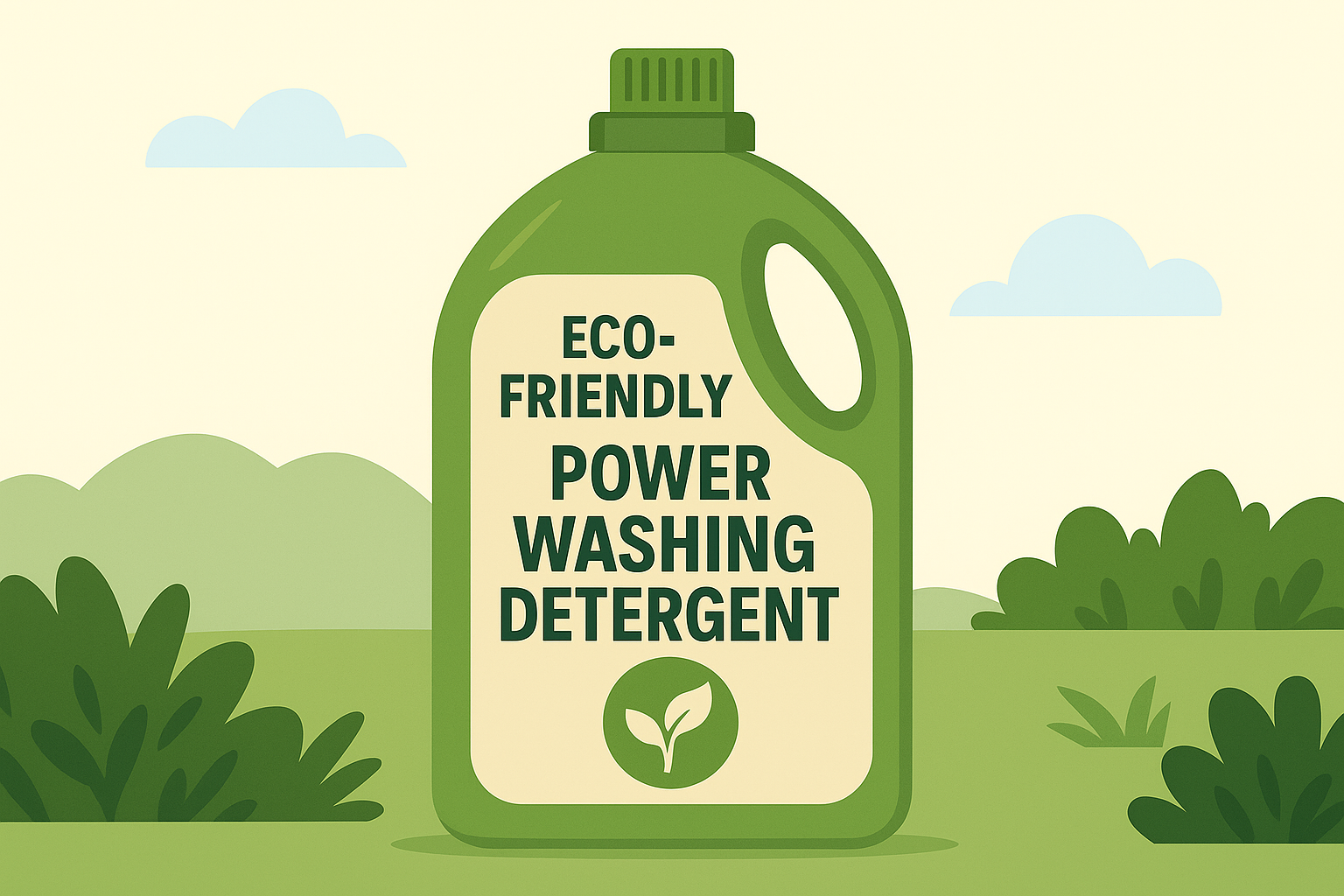
When it comes to keeping your property looking its best, power washing is a go-to solution. But while high-pressure water does the heavy lifting, detergents often play a critical role in loosening grime, mold, and mildew. That said, not all cleaners are created equal — and in a world where more people are thinking about their environmental impact, eco-friendly detergents are gaining attention. 🌍💧
The question is: do they actually work?
Let’s explore the world of biodegradable, non-toxic, and plant-based detergents made specifically for power washing — and whether or not they’re worth using in place of traditional chemical-heavy cleaners. 🧽
🧪 What Makes a Detergent “Eco-Friendly”?
Eco-friendly power washing detergents are designed to:
- Break down naturally without polluting soil or water 🌱
- Avoid harsh or toxic chemicals like phosphates, bleach, and solvents
- Be safe for plants, pets, and aquatic life 🐾🐟
- Work effectively without leaving harmful residues
✅ Look for terms like:
- Biodegradable
- Non-toxic
- Phosphate-free
- Pet and plant safe
- EPA Safer Choice Certified
These products are typically water-based and made from plant-derived surfactants — ingredients that lift and suspend dirt so it can be rinsed away easily.
❌ The Problem with Traditional Detergents
Most conventional cleaners contain:
- Phosphates (harmful to waterways, cause algae blooms)
- Chlorine bleach (damaging to plants, discoloration risks)
- Ammonia or solvents (harmful fumes, surface damage)
- Acids that can etch concrete or kill surrounding vegetation
While powerful, these chemicals can:
- Kill grass and landscaping 🌾
- Harm children or pets who play nearby 🐶👧
- Contaminate stormwater runoff 🌧️➡️🌊
- Damage paint, siding, or stone if overused
💚 Do Eco-Friendly Detergents Work?
Here’s the good news: yes, they do — especially when paired with proper technique and pressure. 💪
Eco-friendly detergents work best for:
- Light to moderate dirt and organic stains
- Regular maintenance cleanings
- Mold and algae removal (with proper dwell time)
- Decks, fences, siding, and roofs
However, they may struggle with:
- Heavy grease or oil stains (like in industrial garages)
- Old, set-in grime that hasn’t been cleaned in years
- Rust or efflorescence (mineral buildup)
But even in those cases, some natural cleaners with citrus-based degreasers or enzymatic formulas can still perform surprisingly well.
🧴 Popular Eco-Friendly Power Washing Detergents
Here are a few highly-rated, effective green cleaners on the market:
- Simple Green Oxy Solve
- Biodegradable, non-toxic
- Works great on siding, driveways, and patios
- Safe for lawns and plants
- Krud Kutter House & Siding Cleaner
- EPA Safer Choice certified
- Removes mold, mildew, algae
- Wash Safe Industries Roof Wash
- Oxygen-based formula
- Perfect for roof shingles and mildew
- H2O Power Wash Concentrate
- Plant-based formula
- Septic-safe and greywater compatible
🛒 Most of these are available in concentrated jugs for use in soft-wash or downstream injectors.
Browse Amazon Here For Eco-Friendly Pressure Washing Detergents
✅ When and Where to Use Eco-Friendly Detergents
| Surface Type | Eco-Friendly Cleaner Rating |
|---|---|
| House siding (vinyl/wood) | ✅ ✅ ✅ |
| Patios and walkways | ✅ ✅ ✅ |
| Decks and fences | ✅ ✅ ✅ |
| Driveways with light dirt | ✅ ✅ |
| Greasy garages (use specialty degreaser) | ❌ |
| Roofs with algae | ✅ ✅ ✅ |
| Painted surfaces | ✅ ✅ |
Use eco-friendly products when:
- Washing near gardens or lawns
- Cleaning around kids or pets
- Rinsing into storm drains or soil
- Doing routine maintenance cleans instead of heavy-duty restoration
🌿 Tips for Maximizing Effectiveness
- Pre-rinse the surface to remove loose debris
- Let the detergent dwell for 5–10 minutes (don’t let it dry)
- Scrub stubborn areas with a soft brush
- Use a low-pressure nozzle to avoid harming plants
- Rinse thoroughly to avoid streaks
🎯 Bonus tip: Apply in cooler parts of the day (early morning or late afternoon) to prevent evaporation before it can work its magic.
🌎 Why It Matters
Even a small cleanup job can result in gallons of dirty water — and if that water carries chemicals into storm drains, rivers, or soil, it can cause long-term environmental harm.
Choosing an eco-friendly detergent reduces your footprint and protects:
- Aquatic ecosystems 🐟
- Pollinators like bees and butterflies 🐝🦋
- Your own garden, lawn, and family 🏡
It’s a small step that makes a big difference over time.
✅ Final Thoughts
Eco-friendly power washing detergents aren’t just a trend — they’re a responsible and effective solution for homeowners and pros alike who want clean results without dirty consequences.
They might not have the bite of industrial cleaners, but with the right preparation and technique, they get the job done while protecting what matters most. 🌿💧
So the next time you fill your detergent tank, consider going green. Your surfaces — and the planet — will thank you. 🌎🧽
Browse Amazon Here For Eco-Friendly Pressure Washing Detergents



